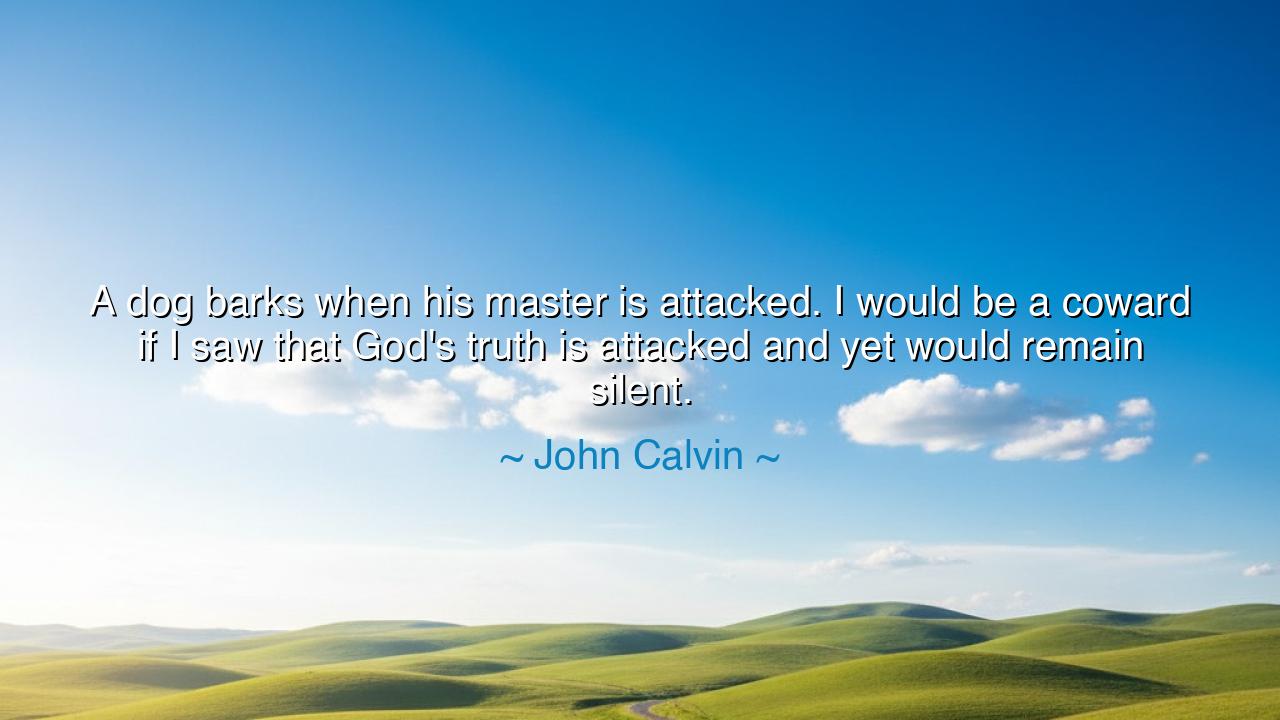
A dog barks when his master is attacked. I would be a coward if I
A dog barks when his master is attacked. I would be a coward if I saw that God's truth is attacked and yet would remain silent.






The towering voice of the Reformer John Calvin echoes through the ages in his powerful declaration: “A dog barks when his master is attacked. I would be a coward if I saw that God’s truth is attacked and yet would remain silent.” In these words lies the essence of courage, conviction, and vigilance. Calvin, a man whose life was bound to the defense of faith during the turbulent era of the Reformation, spoke not only of religious zeal but of a universal moral imperative: to confront falsehood and defend truth wherever it is imperiled. Just as the loyal dog rises to defend its master, so too must the righteous soul rise to protect what is sacred, lest silence become complicity.
The origin of this quote emerges from the context of 16th-century Europe, a time roiled by doctrinal battles, persecution, and the struggle between emerging Protestant thought and established Church authority. Calvin, a scholar and pastor, witnessed heresy, misinterpretation, and corruption threaten the foundations of faith as he understood it. In this environment, he equated God’s truth to a master under attack, and every believer to a vigilant guardian. The metaphor of the dog is deliberate: it is not a sign of blind aggression, but of unwavering loyalty and discernment—an instinctive defense of what one knows to be just and true.
The power of this declaration lies in its call to action. Silence in the face of injustice or falsehood is cowardice, Calvin asserts. The world teems with forces—ignorance, fear, indifference—that would see truth eroded. If the faithful allow these forces to act unchecked, corruption spreads and righteousness falters. Calvin understood that defending truth is not passive; it demands awareness, courage, and a willingness to speak and act, even at personal risk. The moral weight of this principle extends beyond theology to every realm where injustice and deceit threaten the common good.
History offers vivid examples that illuminate Calvin’s teaching. Consider Martin Luther, whose 95 Theses ignited the Protestant Reformation. By boldly challenging the sale of indulgences, Luther risked excommunication, imprisonment, and death. Yet his voice rang forth because he refused to remain silent in the face of what he perceived as corruption and a distortion of faith. Like Calvin’s loyal dog, he barked, not from malice, but from necessity—to defend truth and awaken the conscience of the people. Silence, in such moments, would have been betrayal.
The principle extends far beyond the confines of religion. Think of journalists who expose corruption, activists who speak for the marginalized, or whistleblowers who reveal hidden truths. Each embodies Calvin’s courage: to confront wrongdoing, to defend principle, and to act when the stakes are high. They remind us that truth demands vigilance, and that moral cowardice is often more destructive than the initial assault it seeks to avoid. Inaction, while comfortable, becomes an accomplice to injustice.
Emotion courses through Calvin’s metaphor because it demands that the human spirit rise to its noblest expression. Courage is not the absence of fear, but the presence of duty; it is the choice to act when doing so is difficult, dangerous, or lonely. To defend God’s truth, or any fundamental principle of justice and morality, is to embrace the weight of responsibility. Every moment of hesitation is a test of integrity, and every act of defense strengthens the moral fabric of society.
From this, a clear lesson emerges: do not remain silent when righteousness is threatened. Whether in words, deeds, or personal witness, one must confront falsehood, injustice, and deceit. Speak truth in your community, protect the vulnerable, and challenge error wherever it arises. Silence, though easy, becomes a betrayal of conscience, a surrender to the forces of decay and dishonor.
Thus, the words of John Calvin endure as a clarion call across centuries: “A dog barks when his master is attacked. I would be a coward if I saw that God’s truth is attacked and yet would remain silent.” Let them teach courage in thought, bravery in speech, and steadfastness in action. In defending what is just, true, and sacred, we honor not only God or principle, but the noblest potential within ourselves—the unwavering spirit that refuses to stand idly by while the world falls into shadow.






AAdministratorAdministrator
Welcome, honored guests. Please leave a comment, we will respond soon